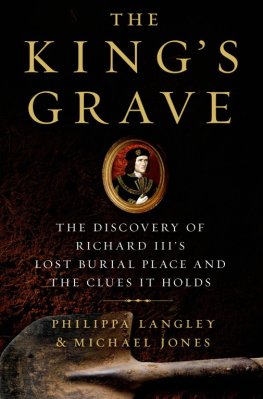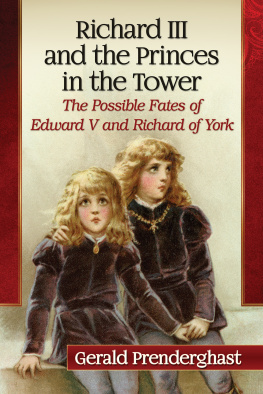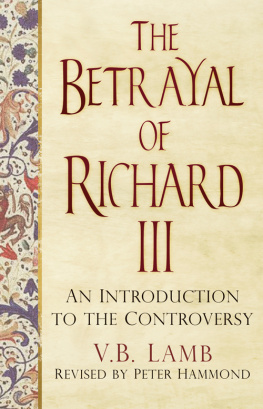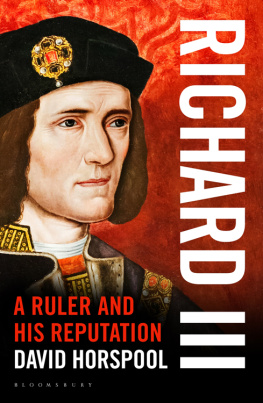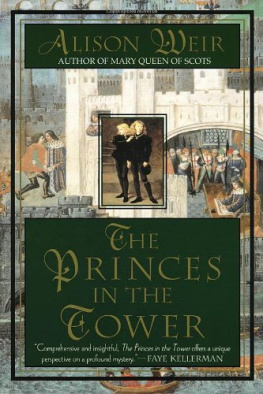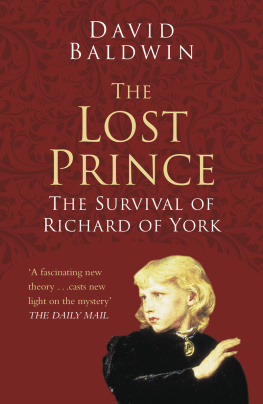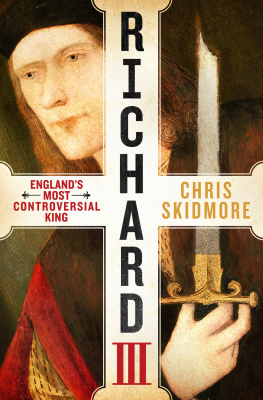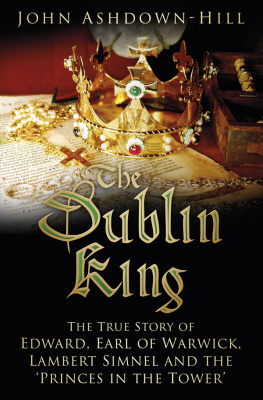Jeremy Potter
Good King Richard?
An Account of Richard III and his Reputation

Contents
Richard III, the so-called last English king of England and the wicked uncle of tradition, is the most controversial and enigmatic of monarchs. Could he really have been as black as he was painted by Tudor chroniclers and, if he wasnt, why do some historians go on saying that he was? Why is his enlightened legislation so little noticed? Is there any real evidence that he murdered his nephews, the princes in the Tower? Did he really have a hunchback or was it invented for him after his death as proof of villainy? Is Shakespeares Richard III a portrayal of the real Richard or no more than a character in a work of fiction? Was St Thomas More really a witness of truth?
Good King Richard? is an account of Richard IIIs life and times, character, appearance and reign, but above all of the Great Debate which has raged since his death between traditionalists and revisionists. Written to mark the 500th anniversary of his accession to the throne, this is a history of his reputation from 1483 to 1983.
The author, who is Chairman of the Richard III Society, makes no claim to impartiality. If it is permissible to borrow from politics and see traditionalists as ranged on the right and revisionists on the left, the perspective of this book represents a view from the inside left position. A balance is attempted nevertheless, and after chapters on the rival traditional and revisionist pictures of the king, the background of the fifteenth century and events of the reign, participants in the Great Debate are introduced and allowed to speak for themselves.
Contemporary writers whose works are examined include the author of a monastic chronicle, an Italian visitor to fifteenth-century London, a Flemish politician, a chantry priest in the Midlands and a London draper. Later protagonists whose involvement and views are recorded include a formidable array of quarrelsome historians and a colourful assortment of the famous. Among the latter are Jane Austen, Francis Bacon, Charles II, Sir Winston Churchill, Charles Dickens, David Garrick, HRH the Duke of Gloucester, David Hume, Charles Lamb, Henry Cabot Lodge, Louis XVI, Sir John Millais, Laurence Olivier, Sir Walter Ralegh, Sir Walter Scott, Rex Stout, Horace Walpole, John Wesley and Sir Christopher Wren.
That Richard III has been seen by posterity almost exclusively through the eyes of his enemies and has as a consequence been grievously wronged in history, literature and legend is, in the authors view, scarcely to be denied. But was he, even so, a villain and, if so, a villain by the standards of his own time and/or ours? This is an argument not only about the nature of truth and the credibility of tradition, but also about the exercise of power and whether public and private morality is indivisible. It should be noted that the title Good King Richard? contains the word king as well as good and a note of interrogation. Whether Richard was a good or a bad king may be understood as a question somewhat different from that of his alleged villainy. Witness Henry VI, the feeble-minded innocent whose rule brought disaster to England and an abrupt end to the Lancastrian line. Or, by way of contrast, the Yorkists successful and wholly unscrupulous contemporary on the throne of France, Louis XI.
The authors debt to, and indeed dependence upon, those who have written about Richard III from the kings time to his own will be apparent. His acknowledgement and gratitude take the form of a bibliography, where their works are listed for reference and as a recommended guide to further reading. The absence of more detailed references in footnotes is to be regretted, but this is a work of historiography intended for the general reader.
Acknowledgement and gratitude for assistance and advice are due in particular to Margaret Potter, Caroline Bradford and Charles T. Wood, and to fellow members of the committee of the Richard III Society: Carolyn and Peter Hammond in their respective roles as librarian and research officer, and Geoffrey Wheeler for the illustrations.
York and Lancaster simplified
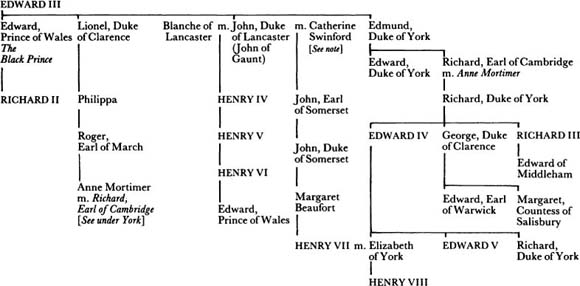
Note: John, Duke of Lancaster (John of Gaunt) married Catherine Swinford after the birth of their children, who were legitimised by Parliament, with the subsequent qualification by Henry IV: excepta
Descent of Richard III
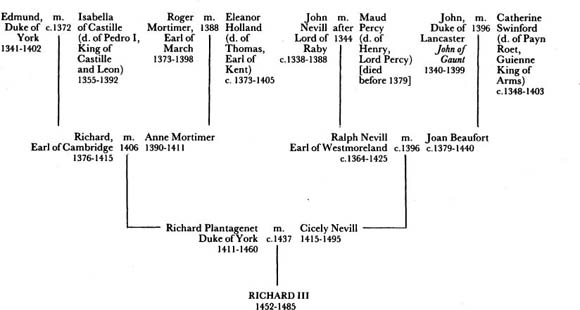
History is not made by great men and women, nor by social and economic forces. It is made by historians. They it is who, scavenging among the relics of the past, select, interpret and speculate and the more distant the period, the larger the element of speculation. Most who have subjected to this process what is known of events in England during the second half of the fifteenth century have not been kind to the last of the Plantagenet kings. They have been no smoke without fire men, opting for the Tudor-inspired tradition and impatient with those who would question it. Yet, as others have recognised, there are different selections, interpretations and speculations which do not violate known facts.
Is history a bare record of known facts or the play of the imagination upon them? Neither definition is adequate. Any historian, however scrupulous, must find some facts significant and others not worthy of note, and in making such judgments is inescapably drawn into bias. History according to the Whigs is not history according to the Tories. History is the winners version of what happened. If the great victories in the Hundred Years War at La Rochelle (1372), Baug (1421), Patay (1429) and Chatillon (1453) are little known in England, it is because they were French victories. And, despite Burys hopeful dictum that it is a science, no less and no more, much of what passes for history is transparently little more than guesswork, sometimes inspired, more often not. Jane Austen is one of those who have expressed surprise at what they were expected to believe about Richard III, and she conveys this view of history through the mouth of Catherine Morland, the heroine of Northanger Abbey, in one of her driest mots: I often think it odd that it should be so dull, for a great deal of it must be invention. (I am fond of history, replies Miss Tilney, and very well contented to take the false with the true.)
From the confines of the Tower of London Sir Walter Ralegh saw history grandly as:
Times witness, herald of Antiquity,
The light of Truth, and life of Memory.
More succinctly and prosaically, it has been described as lies about crimes, and to find support for this harsh verdict one has to look no further than the accusations still widely believed on no evidence worth the name that Richard III murdered successively the Lancastrian Prince of Wales, Henry VI, his own brother George of Clarence, and his own wife Queen Anne.
According to A. L. Rowse (in The Use of History), the historian must be two-minded, part scientific and part intuitive. This refinement of Bury enables him to know, not scientifically but intuitively, that Richard III murdered the princes in the Tower. He concedes that there are plenty of historians who allow their emotional prejudices to bedevil their judgment and proves his own point by comparing Richard to Hitler.
Next page

